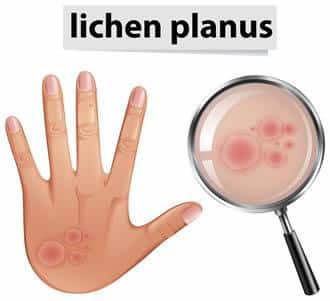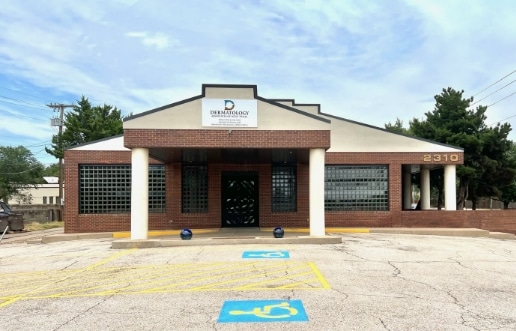
Lichen planus is an autoimmune disorder that attacks both the skin and mucous membranes inside the mouth. This chronic condition causes flat, itchy reddish-purple bumps to develop on the skin (mostly the wrists, ankles, and forearm) and white, painful sores to develop within the mouth and sometimes the genitals. This condition cannot be spread from person to person and mild itching and other symptoms are often managed through simple home care; however, if you are dealing with severe symptoms it’s important to see a dermatologist as soon as possible.
What causes lichen planus?
Lichen planus is not contagious and cannot be spread from person to person. In fact, it typically appears when the immune system starts attacking the skin or mucous membrane. Certain things can trigger it including:
- Certain OTC pain medications (e.g. ibuprofen)
- Medications used for arthritis, hypertension, or cardiovascular disease
- Hepatitis C
- Viral infections
- Certain allergens
- Genetics
- Stress
- Certain chemicals or metals
Those with autoimmune disorders may also be more likely to develop lichen planus. The good news though is that this condition is not dangerous.
Should I see a dermatologist?
If you have developed a purple rash or bumps that resemble lichen planus it’s worth it to pay a visit to your dermatologist to find out what’s going on, especially if you notice any unusual bumps on the genitals.
To determine that you do have lichen planus, we will need to biopsy some skin cells to diagnose lichen planus and to also determine whether it’s being caused by an underlying infection or an allergen. From there, further testing may be needed.
How is lichen planus treated?
So, you found out from your dermatologist that you have lichen planus. Now what? In some cases, this condition may just go away on its own; however, it’s important to recognize that there is no cure for lichen planus but there are ways to help alleviate certain symptoms such as burning or pain. Common treatment options that your dermatologist can recommend or prescribe include,
- Antihistamines: To help with itching
- Corticosteroid creams: To reduce inflammation and redness
- Oral or injectable steroids: This treatment is more effective for persistent, recurring, or more severe bumps
- Photochemotherapy: Light therapy can be effective for treating oral lichen planus
Dealing with dark itchy bumps that have you wondering whether you could be dealing with lichen planus or another skin disorder? If so, a dermatologist will easily be able to diagnose your skin condition, usually through a simple physical exam. If you are experiencing symptoms of lichen planus, schedule an appointment with your dermatologist today.



